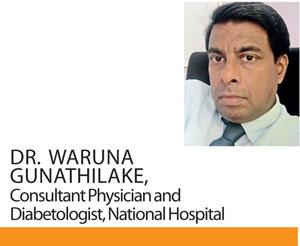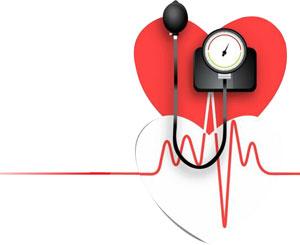17 May 2019 - {{hitsCtrl.values.hits}}

 Disease and age are co-related. Ageing not only deprives a person of youthfulness it also weakens the immunity system leaving the body vulnerable to various illnesses. High blood pressure is one such condition. World Hypertension Day (May 17) focuses on the theme ‘know your numbers’. The occasion highlights the importance of being aware of one’s blood pressure and maintaining a healthy blood pressure level. In this week’s edition of Health Capsule we have spoken to Dr. Waruna Gunathilake, Consultant Physician and Diabetologist at the National Hospital of Sri Lanka, Colombo, to feed you with vital knowledge regarding high blood pressure.
Disease and age are co-related. Ageing not only deprives a person of youthfulness it also weakens the immunity system leaving the body vulnerable to various illnesses. High blood pressure is one such condition. World Hypertension Day (May 17) focuses on the theme ‘know your numbers’. The occasion highlights the importance of being aware of one’s blood pressure and maintaining a healthy blood pressure level. In this week’s edition of Health Capsule we have spoken to Dr. Waruna Gunathilake, Consultant Physician and Diabetologist at the National Hospital of Sri Lanka, Colombo, to feed you with vital knowledge regarding high blood pressure.
According to Dr. Gunathilake, research conducted in the country estimates that statistically six-seven in every ten Sri Lankans would be suffering from high blood pressure. This is a condition which is highly prevalent in the country. The numbers suffering from hypertension is more likely to increase over time. This is due to the increasing incidence of risk factors which contribute to the development of high blood pressure.
The heart pumps blood throughout the body by contracting and relaxing. The blood is carried to all parts of the body in blood vessels. During the functional status of the heart, the amount of pressure applied on the walls of the blood vessels is termed as a person’s blood pressure. The average normal blood pressure of a healthy adult is considered to be 120/80 mmhg.
What kind of hypertension do you suffer from?
Dr. Gunathilake stated that high blood pressure is mainly of two types.

The walls of the blood vessels get progressively thicker due to various reasons with age that contributes to the gradual elevation in blood pressure. “This thickening can be attributed to multifactorial ageing components which include high cholesterol levels and a person’s dietary habits. Therefore everyone is a victim of experiencing an elevated blood pressure as they age. This form of hypertension is known as essential hypertension. The other form of high blood pressure is secondary hypertension. This occurs secondarily as a consequence due to a main complication. Kidney problems, tumours in the body especially the adrenals as well as medication for certain diseases can elevate blood pressure. It is important to note that obesity, high lipid levels in the body, ischaemic heart diseases and diabetes are some of the major risk factors,” mentioned Dr. Gunathilake.
Hypertension risk factors
When considering the causes of hypertension, age is definitely a causative factor. With age, blood pressure gradually increases.
As previously mentioned, this is due to the fact that the thickness of the walls of the blood vessels increases resulting in a rise in pressure. “The list of causative factors for hypertension also includes some risk factors that might consequently cause hypertension. It is important to note that obesity, high lipid levels in the body, ischaemic heart diseases and diabetes are some of the major risk factors that contribute to hypertension among others such as a sedentary lifestyle, smoking and stress,” he inferred.
It should be mentioned that unlike hypertension, low blood pressure only occurs secondarily to various physiological conditions such as cardiac shock and dehydration. Low blood pressure is not a disease entity itself.
Signs, diagnosis and treatment
On most occasions, hypertension will not display symptoms and is often detected when the blood pressure is being checked. In the case of very high blood pressure, symptoms like dizziness, blurred vision and severe headaches can be experienced. However Dr. Gunathilake warned that these symptoms only appear at the later stages.The diagnosis of the high blood pressure condition is done by checking blood pressure. “It is important to ensure that monitoring of blood pressure is done to a routine. Just obtaining a reading once may not be sufficient to label a person as a hypertension patient. Thereby blood pressure readings should be obtained in a serial manner which allows for an accurate conclusion of the state of a person’s blood pressure. Blood pressure varies with gender and time of day as well,” he elaborated. The consultant physician further continued to explain that blood pressure is multifactorial. “Even if the measured blood pressure deviates from 120/80 mmhg this may not necessarily indicate that a person suffers from hypertension. For example, a person’s blood pressure could be measured to be 110/70mmhg or it could be 160/75 mmhg. However as long as the person does not experience any discomfort, the blood pressure cannot be considered abnormal. The determination of hypertension varies with the individual,” he elucidated.
The burden of high blood pressure exists at various stages; mild, moderate or severe. Treatment will vary according to the stage of hypertension. Medication is important. As essential hypertension occurs with age, behavioural patterns and lifestyle adjustments would be additionally made as part of treatment and control. Different drugs have different pathways to reduce blood pressure. However the ultimate result through medication is to dilate the blood vessels to promote the smooth flow of blood and reduce blood pressure. “When considering treatment, attention has to be directed to the cause of hypertension. When the reason behind elevated blood pressure appears as a complication due to a major disease condition, it is important to obtain medication for the main disease and the blood pressure will return to normal as the condition is treated. When the causative disease is relieved, blood pressure goes down as well. However as essential hypertension occurs due to ageing, long-term medication would be deemed necessary to keep the blood pressure under control. At ages 40 and above, it is important to periodically check blood pressure and monitor it,” advised Dr. Gunathilake.
When left untreated, hypertension may give way to complications. Multi organ failure is a major consequence. Strokes, heart attacks and kidney failure are the main complications. Ischaemic heart diseases and other vascular problems are other adverse effects of hypertension. Dementia is another danger that looms behind untreated hypertension. Therefore Dr. Gunathilake highlighted the importance of regulating blood pressure.
Keeping hypertension at bay
In order to maintain healthy blood pressure levels and prevent hypertension, deflection has to be made from a sedentary lifestyle and a physically active lifestyle should be embraced. To ensure that one stays protected from obesity and cholesterol, which are some of the risk factors leading to essential hypertension at an older age, attention has to be paid to one’s diet. A healthy balanced diet has to be followed. “Sri Lankans especially tend to have meals with much salt, sugar and fat. They are quite harmful. Salt is especially bad for blood pressure. Salted biscuits, peanuts, tomato sauces, ketchup, kottu roti as well as pastries are food items that have high levels of salt and should be avoided as much as possible as you age. Sri Lankans have a bad habit of adding salt when cooking rice which is quite unhealthy. The addition of salt has to be avoided when cooking rice. Most of the food consumed daily leave people highly exposed to taking salt. It pays to be diligent to the salt content especially when buying packaged food. The taste may not divulge it, but they will contain high levels of salt,” he warned. Therefore it is quite important to control one’s salt intake. People should be inclined towards healthy freshly prepared home food with minimum salt addition.
One should take care to guard oneself against diseases that lead to secondary hypertension as a complication. All in all, the prevention of hypertension amounts to a healthy lifestyle pattern and diet which would go a long way in maintaining good health.
22 Dec 2024 19 minute ago
22 Dec 2024 2 hours ago
22 Dec 2024 2 hours ago
22 Dec 2024 5 hours ago
22 Dec 2024 5 hours ago